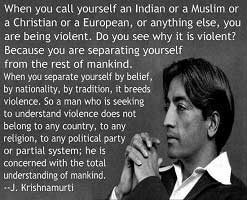
[I would qualify the statement above by adding that it is the depth to which you identify yourself primarily and solely with your particular beliefs, culture, race or nation, that is the depth by which you separate yourself from all that you share with the rest of humanity.]
On the topic of religion and violence, one cannot help but notice how religions piggy back on the horrors of war to both strengthen themselves and grow, or to strengthen the soldierʼs resolve, which usually makes wars last longer and grow bloodier. That includes when the cause of war is not religious. See for instance, The Civil War as a Theological Crisis by Evangelical Christian and historian of Christianity, Mark Noll. Or see what religion made of World War I. Religion made out like a bandit in that war, emphasizing it as the beginning of the worldʼs final judgment, even piggybacking on apocalyptic wartime fears to help the Pentecostal faith grow, see The Great and Holy War: How World War I Became a Religious Crusade (received Christianity Todayʼs Book Award of Merit for 2015).
Second, scholars who claim religion has little to do with violence define “religious wars” in an extremely narrow fashion, as if they could only be deemed religious wars if Martin Luther and the pope literally led the troops themselves and they were fighting solely over the meaning and practice of the Lordʼs Supper. But in reality religion is interwoven into culture, society and governance and hence was implicit in many tragic wars for centuries and helped heighten tensions and divisions not only between theologians, but between kings and their respective kingdoms, and energized troops to fight and kill with greater ferocity and to reject talk of compromise longer.
Also, fighting over land and the extension of oneʼs kingdom (as well as cases of colonization of foreign lands) were related to spreading the religious beliefs of oneʼs kingdom, literally, back then. By the same token, to spread questions or heretical views of Christianity in such kingdoms was labeled not only a crime against God but also equated with treason and sedition. The idea that heretics must be persecuted was the rule for fourteen hundred or more years in European Christian society, defended by the papacy as well as the Reformers, Luther and Calvin, etc. (I also have posts on why that was so, biblically speaking.)
On the other hand one must not focus solely on religionʼs role in promoting divisiveness and violence, because mass movements also arise that are not strictly religious but which resemble religions claims in certain respects. Such alternative mass movements can arise in the realm of politics (ultra-liberal vs. ultra-conservative, unions vs labor, eco-terrorists vs industrialization, etc.). Pride in oneʼs nation can become religion-like, so can pride in oneʼs heritage or race. And such movements can be coupled with claims that they are the best or only way. Sometimes such movements even promise a heavenly paradise on earth, be it a ‘workerʼs paradise’ or a ‘land of Aryan supremacy,’ or a world of Japanese supremacy, and they rely on highly generalized scapegoats—‘outsiders’ ‘heretics’ to blame for why things arenʼt going the ‘right’ way (something religions also do) which helps keep members of such movements united and energized in their shared hatreds. Such scapegoats have included ‘the Jews,’ ‘the Bolsheviks,‘ ‘the bourgeoisie,’ ‘the running dogs and paper dragons of the West.’ See Eric Hofferʼs classic little book, The True Believer that explains the similar psychological traits of people attracted to enthusiastic mass movements, be they Christian, Muslim, fascist or communist.
All such cases above, including political, nationalistic, racist and religious mass movements, especially those that hugely generalize who their enemies are, and who draw a sharp distinction between ‘us’ and ‘them,’ have incited violence for ‘the cause.’ Therefore, religious beliefs, especially those that employ hugely generalized scapegoats and sharp distinctions between ‘us’ and ‘them’ most certainly contribute to animosities and violence.
Labels:Christian Apologetics, Christian emperors, Christianity & violence, Civil War, Eric Hoffer| Help Ed score 100% on YSlow. Server Fees & 🍪-free *CDN. This page was designed and tested by Night Owl using GTMetrix on 4/29/2017. | |||
| *Content Delivery Network | PageSpeed (100%) | YSlow (99%) | Onload Time 0.342s Fully Loaded Time 1.1s Pagespeed 100% YSlow 99% |